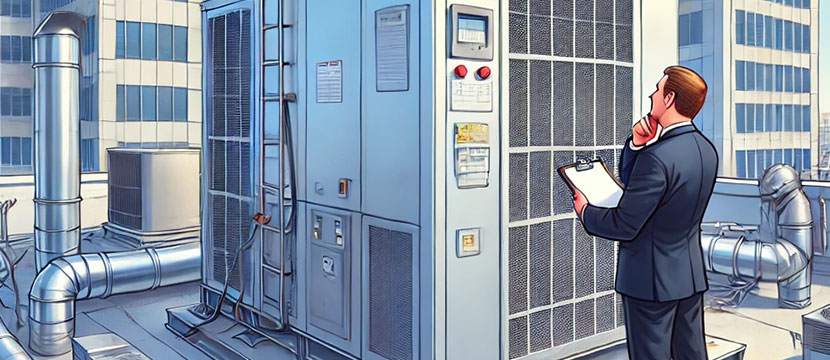As a facility manager, there’s a lot to juggle, and understanding your building’s HVAC system is one of the most critical responsibilities on your plate. After all, a properly maintained HVAC system does more than just keep people comfortable.
This equipment also saves energy, improves air quality, and protects your building’s infrastructure. In this guide, we’ll break down the basics to give you the confidence you need to manage your HVAC system like a pro.
What is the Primary Purpose of an HVAC System in Commercial Buildings?
At its core, an HVAC system has three jobs: heating, cooling, and ventilation. Here in South Florida, the focus is almost entirely on cooling and ventilation due to our year-round warm and humid climate.
A reliable HVAC system keeps your indoor spaces comfortable, prevents issues like mold caused by excess moisture, and ensures that air quality meets health and safety standards.
Understanding these core functions will help you make smarter decisions about your building’s HVAC needs.
Core Functions of Commercial HVAC Systems
- Heating – While heating isn’t a huge priority in South Florida, heat pumps and electric heating elements are often included in commercial HVAC systems for the occasional chilly day.
- Cooling – Cooling is the primary function, with systems designed to handle the relentless heat and humidity of our region.
- Ventilation – Good ventilation is a must-have feature because it improves air quality and helps regulate humidity levels.
Key Components of a Commercial HVAC System
To manage your system effectively, it’s helpful to know the parts that make it work:
- Air conditioning units – These are often central air systems or split systems that cool the air.
- Air handlers – Responsible for distributing conditioned air through ductwork.
- Ductwork – Channels air throughout every corner of your building.
- Thermostats and controls – Allow you to set temperatures and manage energy use.
- Dehumidifiers – Crucial for reducing humidity and preventing mold in South Florida’s climate.
What Types of HVAC Systems Are Common in South Florida?
Commercial properties have different HVAC needs, and these are the most common system types you’ll encounter:
- Rooftop units (RTUs) – Found on many office buildings and retail spaces, these units are compact and efficient.
- Split systems – With separate indoor and outdoor units, these are a versatile choice for many building sizes.
- VRF systems – Ideal for spaces requiring multiple temperature zones.
- Chiller systems – Used in extensive facilities like hospitals and universities for cooling.
Why is Humidity Control Important in South Florida?
Humidity control is important in South Florida because high humidity can be harsh on buildings. If not managed properly, it can lead to mold, poor air quality, and discomfort for your building’s inhabitants.
Your HVAC system should include features like dehumidifiers and drain lines to manage excess moisture. Regular maintenance, such as clearing clogs from drain lines, is key to controlling humidity and protecting your facility.
How Can You Maximize Energy Efficiency in Commercial HVAC Systems?
You can maximize energy efficiency in your commercial HVAC systems with the following tips:
- Look for systems with high SEER ratings, which measure cooling efficiency.
- Consider investing in Energy Management Systems (EMS) to monitor and optimize your energy use.
- Stay current on routine maintenance like changing filters to mainstem system efficiency.
The Lifespan of a Typical Commercial HVAC System
Most commercial HVAC systems last 10–15 years, but this depends on factors like usage, maintenance, and environmental conditions. In South Florida, systems work harder due to the heat and humidity, so proactive care is critical.
Scheduling regular inspections and addressing minor issues early can help extend your system’s lifespan. However, if your system is already 10-15 years old, maintenance won’t delay the inevitable—you’ll need to replace or upgrade that system sooner rather than later.
Building Strong Vendor Relationships
The biggest thing to know in your new role is that managing a commercial HVAC system isn’t a solo job. Partnering with a dependable HVAC contractor can save you time, money, and stress. Look for a vendor with extensive experience in South Florida’s climate and a track record of supporting commercial properties like yours.
A great vendor relationship ensures you have:
- Proactive maintenance – Scheduled upkeep to prevent major breakdowns.
- Emergency 24/7 support – Quick response times for urgent repairs, especially during hurricane season.
- Expert guidance – Advice on system upgrades, replacements, and energy-saving options.
The right contractor becomes your go-to resource for all things HVAC, which means peace of mind knowing your building is always running smoothly.
Preparing Your HVAC System for Florida’s Weather Challenges
Florida’s weather can be unpredictable, especially during hurricane season. Taking steps to protect your HVAC system before a storm hits can save you from costly repairs and downtime. Here are some practical tips:
- Secure outdoor units – Anchor rooftop and ground-level units to prevent them from shifting or tipping during high winds.
- Shut down before the storm – Powering off the system helps protect it from electrical surges and debris damage.
- Inspect and clear the area – Remove any loose items, debris, or vegetation around outdoor units to prevent damage from flying objects.
- Cover the unit – Use a breathable, weather-resistant cover to shield the unit from debris without trapping moisture inside.
- Elevate equipment in flood zones – Protect units from potential water damage by elevating them above anticipated flood levels.
- Check backup power sources – Ensure your generators are in working order to maintain cooling during a power outage.
If you’re a new facility manager with questions about storm preparation or any other HVAC concerns, don’t hesitate to contact us. At All Pro Mechanical, we’re passionate about supporting local businesses and helping you keep your building running smoothly. Call us at (954) 977-7878 anytime—we’re here 24/7 for all your HVAC needs.

 (954) 977-7878
(954) 977-7878 CALL US NOW
CALL US NOW







